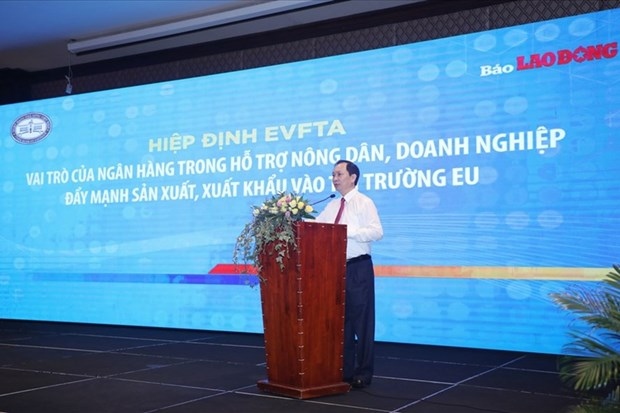Banks helps boost exports to EU
Connectivity between banks, businesses, and farmers in value chains is essential for Vietnamese goods to enter the EU market, a workshop in Hanoi on November 20 heard.

The EU-Vietnam Free Trade Agreement (EVFTA), which came into force on August 1, has been described as an “expressway” leading Vietnamese goods, especially agricultural and aquatic products, which are among the country’s strongest, to the EU.
However, the EU’s strict requirements could be an issue for businesses or farmers seeking to enter the market on their own.
Nguyen Dinh Tung, Chairman and General Director of Vina T&T Group, said that, in value chains, apart from connectivity between farmers and businesses, capital sources also form a very important link.
Farmers need capital to make investments but accessing loans is problematic. The engagement of banks in these chains would therefore facilitate farmers’ access to capital, he noted.
Deputy Governor of the State Bank of Vietnam (SBV) Dao Minh Tu said that as of October 30, credit granted for agriculture and rural area-related activities had increased 6.5% against the end of 2019. It now stands at about VND2.16 quadrillion (US$93.3 billion), including VND27 trillion for hi-tech agriculture and VND5 trillion for enterprises involved in value chains.
Ha Thu Giang, Deputy Director of the SBV’s Department of Credit Policies for Economic Sectors, said developing connectivity in agriculture is viewed as an inexorable trend and one of the key solutions to improving the effectiveness of agricultural production.
The central bank has adopted many policies to channel capital into the sector, she noted, adding that more than 80 credit organisations and 1,181 people’s credit funds have granted loans for agriculture and rural areas nationwide.
This type of credit grew 19.83% between 2016 and 2019; higher than the overall growth rate of 16.02%, Giang said.
She also acknowledged certain challenges, such as farmers violating contracts, the modest number of hi-tech agricultural zones, and the lack of effective models.
Of a similar mind, Can Van Luc, Chief Economist at the Bank for Investment and Development of Vietnam (BIDV), pointed out that policies on hi-tech application in agriculture haven’t been conducted consistently, cooperation between farmers, the State, banks, scientists, businesses, and cooperatives/associations remains unsustainable, and some companies haven’t seriously realised their commitments to buy products from farmers.
He recommended that the Party issue a new resolution on agriculture, farmers, and rural areas, and that the Government direct ministries and sectors to perfect market and price forecasting systems to help farmers and businesses develop suitable orientations.
Meanwhile, Luc added, credit institutions should reform procedures to enhance farmers’ access to capital.

